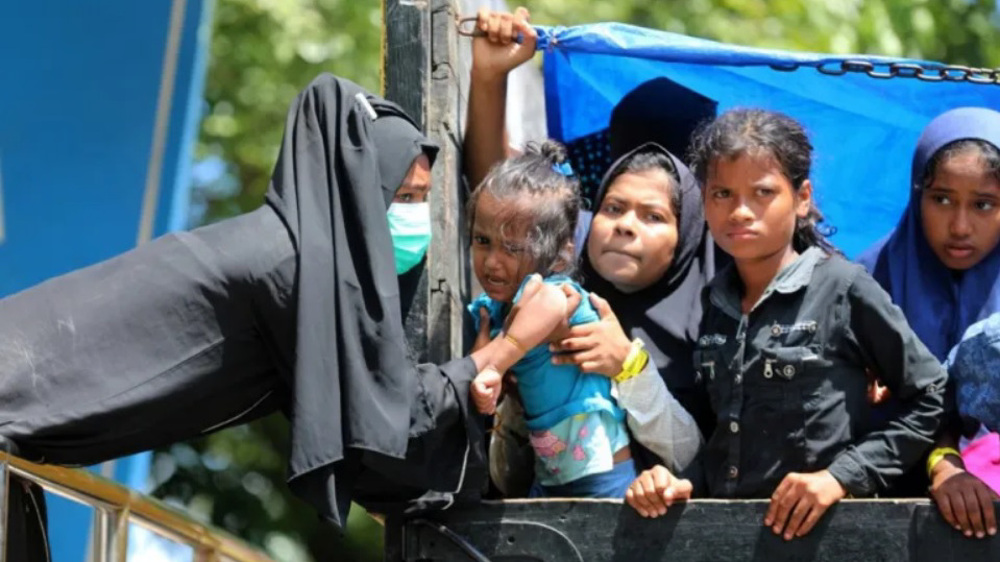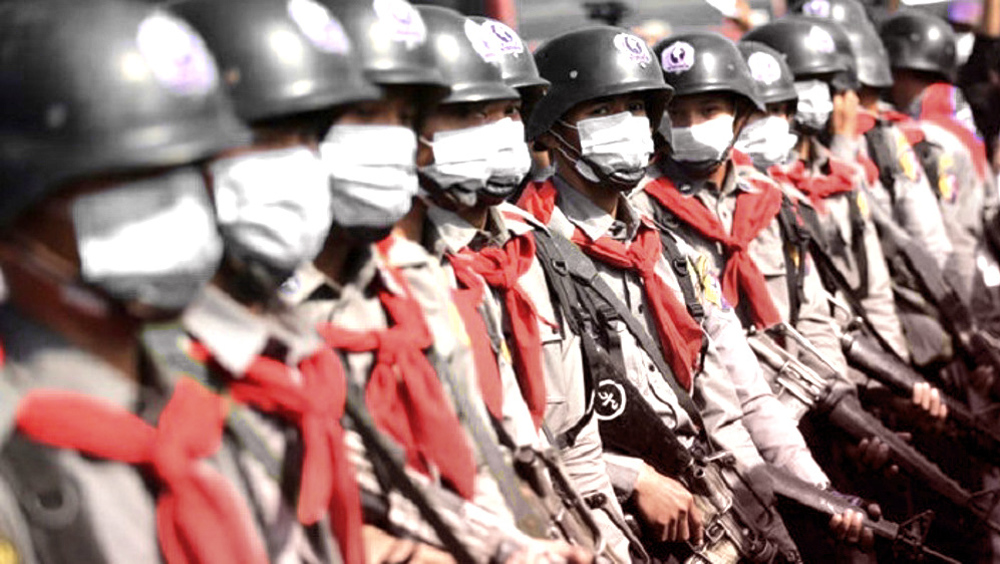Myanmar anti-coup rallies: Military attacks protesters with rubber bullets, tear gas
Myanmar’s military has fired tear gas and rubber bullets to disperse thousands of people who took to the streets for the fourth consecutive day to protest against the recent coup d'état in the country.
Police fired rubber bullets and used teargas against people defying a military ban on large gatherings in the capital, Naypyidaw, on Tuesday.
Police warned on loudspeakers that force could be used if the crowd did not leave the area and threatened to fire live ammunition if the protesters crossed police barricades.
Protesters were seen on footage posted on social media running for cover as the sound of gunshots was heard.
Citing a doctor at a clinic in the city, Reuters said three people were being treated for suspected rubber bullet wounds.
Witnesses also said that police had initially used water cannon and tried to push a large crowd back, but the demonstrators responded by hurling projectiles.
In the country’s second-largest city, Mandalay, police arrested at least 27 protesters.
A journalist from the Democratic Voice of Burma (DVB) was also arrested while filming the rally. He said that the military was beating people during the protest.
Those arrested could face prosecution for “unlawful assembly,” said a military notice.
Protesters have been demanding that power be handed back to elected officials, who have been in power since a coup earlier this month.
Earlier on Tuesday, the military imposed a curfew in major towns and cities across the country, including Naypyidaw and the country’s largest city, Yangon, which has also been the scene of large demonstrations.
Under the ban, people are prohibited from gathering in groups of more than five.
They are banned from joining protest rallies on foot or by car, and are not allowed to make political speeches in public.
The military did not say how long the restrictions would remain in place.
The military detained Myanmar’s de facto leader Aung San Suu Kyi and President Win Myint as well as other senior figures from the ruling party on February 1, claiming irregularities in the November 2020 elections that saw Suu Kyi’s National League for Democracy (NLD) party win a majority of seats.
The military handed power to General Min Aung Hlaing and promised to hold a new election.
Internet and telephone connections have been disrupted.
The international community has condemned the military takeover, calling for the release of detainees and the resolution of the situation through dialog.
New Zealand halts relations with Myanmar
New Zealand’s Prime Minister Jacinda Ardern said on Tuesday that her government was suspending all high-level contact with Myanmar and imposing a travel ban on its military leaders.
“Our strong message is we will do what we can from here in New Zealand and one of things we will do is suspend that high-level dialog,” she said.
Ardern said the move was taken to “make sure any funding we put into Myanmar does not in any way support the military regime.”
She said that her country’s aid program to Myanmar had been worth about NZ$42 million ($30 million) between 2018 and 2021.
Foreign Minister Nanaia Mahuta said in a separate statement that Ardern’s government did not recognize the legitimacy of Myanmar’s junta and called on the military to immediately release all the detained political leaders and restore civilian rule.
Separately, United Nations (UN) spokesperson Stephane Dujarric said the military restrictions in Myanmar were “concerning” and limited the ability of citizens to speak up.
The UN Human Rights Council will also hold a special session on the county’s situation on Friday.
The US State Department also said it was “very concerned” about the bans on public gatherings.
Myanmar was ruled by the military until 2011, when Suu Kyi ended the junta rule and introduced what were presented as reforms. She had been under house arrest before.
Her party, however, cultivated close relations with the junta from the beginning of its activity and formed an alliance with senior military officers.
She supported the military in a deadly campaign of genocide against the Rohingya Muslim community in Myanmar’s western state of Rakhine.
Suu Kyi also defended the military atrocities against the Rohingya people at the UN’s top court in The Hague in December 2019.
‘No two-hour war’: Iran vows immediate retaliation to any attack
Pezeshkian: US must end provocations if it seeks genuine diplomacy
Iran summons German ambassador over Merz’s ‘low-minded’ remarks
Iran's Armed Forces warn EU of ‘consequences’ of IRGC designation
Iran FM: EU’s blacklisting of IRGC a ‘major strategic mistake’
EU blacklists IRGC in legally flawed move irrespective of consequences
VIDEO | Press TV's news headlines
VIDEO | Afghanistan opens first specialized cancer hospital















 This makes it easy to access the Press TV website
This makes it easy to access the Press TV website